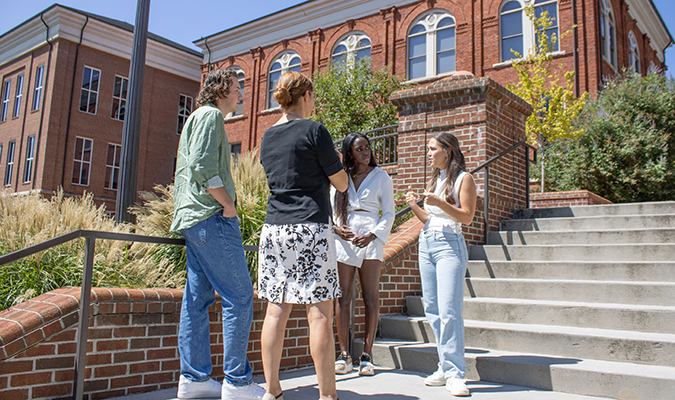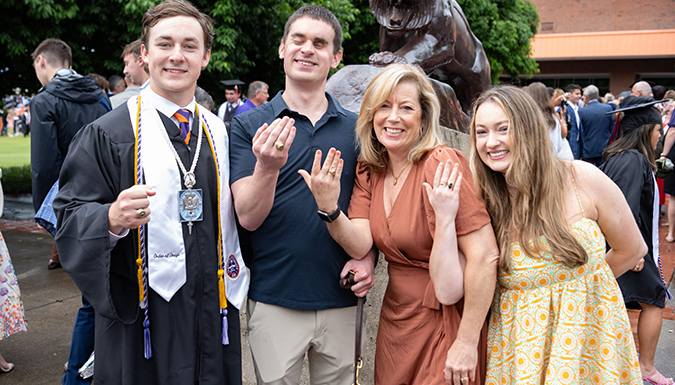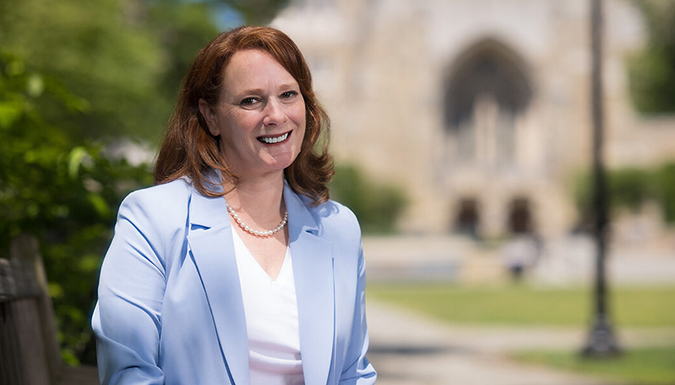What are the humanities?
The humanities are a collection of disciplines (including English, Languages, History and Philosophy) that use reason and textual evidence to explore the fundamental questions of existence that we ask ourselves from time to time: who am I? Why am I here? Who were the people who came before me and what did they think, feel and do? How should I behave now? What is important? The humanities help us understand ourselves and others, and give us the tools to express and communicate our thoughts, feelings and desires.

5 reasons to study the humanities
1. Develop resilient career skills
In February 2024, the New York Times proclaimed, “When Your Technical Skills are Eclipsed, Your Humanity Will Matter More Than Ever.” That headline led an article by Aneesh Raman, a workforce expert at LinkedIn, and Maria Flynn, president of Jobs for the Future, who wrote, “The early signals of what A.I. can do should compel us to think differently about ourselves as a species. Our abilities to effectively communicate, develop empathy and think critically have allowed humans to collaborate, innovate and adapt for millenniums.”
Similarly, a recent list by Indeed of the Top 11 Skills Employers Look for in Job Candidates was topped by communication, leadership, teamwork, interpersonal, learning/adaptability and self-management skills, all of which are the objective of a liberal arts or humanities-centered education. At Clemson, we encourage students to pair the communication, interpersonal and critical thinking abilities learned through their humanities courses with technical skills from resources including our Adobe Studio & Makerspace in order to be career-ready leaders.

Clemson or Bust: Ryan Uhle
Attorney at Nelson Mullins
Uhle, a B.A. History alumnus, didn't let blindness stand in the way of achieving a legal career.
Read his story2. Learn to communicate
Effective communication and strong writing skills are at the core of all humanities courses. You will be trained to form, articulate and defend ideas in both written assignments and class discussions. In 2024, LinkedIn listed communication as the No. 1 most in-demand job skill. In addition to our literature courses in the Department of English and our interdisciplinary courses in Professional Communication and Information Design (PCID), our Writing Lab and the Pearce Center for Professional Communication create opportunities beyond the classroom for students to hone their craft.

The Winding Road of Success: Renee Kopkowski
Vice president for public affairs and communications at Yale University
An alumna of the Department of English, Kopkowski has led a successful career in communications and public relations, holding various communications leadership roles for the likes of Mars, Incorporated, Popeyes Louisiana Kitchen and Georgia Tech.
Read her story3. Think critically
The humanities encourage students to analyze texts and claims to identify patterns and point out inconsistencies. You will learn to read and notice not only what is said but what is omitted, you will learn to listen not only for words but for themes, and you will be trained to understand the context of communication to understand its meaning. Critical thinking is essential to many professions and is key to successful legal careers, which are a frequent path to success for humanities majors. CAH’s majors in philosophy and history both offer concentrations with a legal emphasis, and we are proud to host Clemson University’s pre-law advisor.

Dream achiever: Delaney Toomer
Hard work and a love of reading helped propel English major Delaney Toomer to the law school of her dreams.
Read her story4. Converse with other cultures
The study of languages has benefits beyond simple fluency. In learning the literature, history and philosophies of the world’s cultures, you can begin to understand how the intersection of ideas has shaped the world we live in. And you begin to understand not only which words can be understood in another language, but which ideas resonate with people from different backgrounds. Most importantly, you learn how to empathize and connect with people from all walks of life.

Top of the Class: Natalie Claypool
Language and International Health major wins top honor for the Class of 2022
Claypool spent her final semester as an undergraduate studying abroad at Universidad Blas Pascal in Córdoba, Argentina. As one of the Class of 2022’s most distinguished students, Claypool has no shortage of career opportunities. But instead of pursuing the most lucrative option, she chose service to the most vulnerable with a year-long fellowship at Casa de Esperanza in Houston.
Read her story5. Develop a moral and ethical framework
As Socrates is noted as saying, “The unexamined life is not worth living.” For many students, the college experience is an optimal time to examine their lives and consider not only what goals they want to pursue in life, but why. The studies of religion, literature, philosophy and history each in their own way push students to consider life’s purpose and to establish a framework for ethical decision-making. This period of reflection is of equal importance for humanities majors and for majors in business or the sciences with a profound impact on career choices and personal fulfillment.

Combining Science and Philosophy: Louise Franke
Clemson's first Rhodes Scholar
Louise Franke made history as the first Clemson University student to be named a Rhodes Scholar. The Rhodes Scholarship provides for study at the University of Oxford and is recognized worldwide as the top undergraduate award for college students. As a biochemistry major with minors in philosophy and political science, Franke has a unique perspective on the relationship between the study of science and humanities.
Read her story
